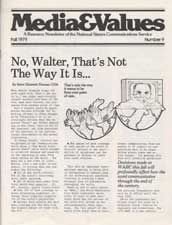Sports: Is It Just
|
This article originally appeared in Issue# 9
|
Why are television sports so popular? Is it because they gratify some very basic needs in each of us? And in our society?
It's an endless cycle.
Football now begins in July, just after baseball's All-star Game. By November, basketball and hockey are well underway -- the pros on the networks; local teams on independent and cable stations.
In between it's soccer and swimming, gymnastics and track, skiing, surfing, sailing, skydiving, skating and skateboarding. And every four years, the greatest televised sports marathon of them all — the Olympics — is broadcast, live, throughout the entire world.
Sports television is now Big Business. In fact, some say the whole face of professional and college sports has changed with the large revenues made possible through television. The pause for commercials and the needs of cameras and scheduling take precedence over the natural pacing of the game. Even the entrance of the teams is timed to the exact second of the director's script. Today sports may be more show biz than game.
At the same time, the financial stakes have grown enormously. The top two college teams each year can claim a cool minion for participating in a post-season Bowl game courtesy of the network covering the game. And Olympics contracts flow run into the billions of dollars.
Sports draw the largest audiences of any type of programming, have expanded to fill more time in the schedule and command some of the best technical performances by camera crews and technicians in the medium.
What makes sports, and football in particular, so popular on television? Often, when discussing the place of television in society the final, unanswerable statement made — either apologetically, defensively, or sneeringly — that "It's only entertainment."
Supposedly, common sense tells us that entertainment is something that should relax us, give us pleasure and lack ambiguity. The final arbiter of entertainment is an individual's taste and for that there is no accounting. But a serious look at light entertainment opens some areas for thought.
Just as we've discovered that common themes and treatments of comedy and variety series fulfill certain needs in the audience, the same holds true of sports. The common elements that entertain us in musical comedy, variety specials, the news, westerns and adventure stories come into play in the sports world, particularly in football.
Richard Dyer, lecturer in film for the universities of Keele and Birmingham in Britain, makes a case for entertainment as a utopian sensibility. He says:
"The notion of entertainment as in some sense utopian -- expressing ideals about how human life could be organized and lived --is implicit in what the most widespread assumption about entertainment, namely, that it provides 'escape.' Entertainment offers the image of 'something better' to set against the realities of day-to-day existence."
Expanding on Dyer's thesis, the accompanying chart identifies five categories of social tension and the utopian solution that humankind images in order to cope with each inadequacy. Developing these images in tens of television — sports and news — one can begin to understand why television-as-entertainment works so well, why so many millions of us will be glued to the set to watch our favorite teams, and then come back to watch it all again on the late-night news.
| Social Tension | Utopian Solution | Football | TV News |
| Exhaustion Work as grind Alienated labor Pressures of urban life |
Energy Acting vigorously Human power and activity |
Vigor of game Tackling, running Fan reactions, cheering Instant replays |
Speed of series of short items 'Live' coverage of news events |
| Scarcity Actual poverty Unequal distribution of wealth |
Abundance The conquest of scarcity Having enough and to spare Enjoyment of sensuous, material things |
Half-time activities Color, bands Cheerleaders Sumptuous uniforms High-salaried players |
Technology of news gathering Doings of the rich Spectacles of pageantry or destruction |
| Dreariness Monotony Predictability Daily routine |
Intensity Experiencing of emotion Directly, fully, authentically Without holding back |
Competition Limited time to perform Teams face off for play Action packed into short time frame |
Emphasis on violence, dramatic incidents Selection of visuals with eye to climactic moments |
| Manipulation Advertising Bourgeois democracy Sex roles |
Transparency Open, spontaneous, honest communications and relationships Love, sincerity |
Team spirit Fan loyalty Player statistics and background Color |
"Folksy" style of newscasting Focus on celebrities, politicians Simplification of events to allow easy comprehension |
| Fragmentation Job mobility Rehousing, development High-rise urban life |
Community Togetherness Communal interests Sense of belonging Collective activity |
Huddle Cheers and songs Crowds in the stands Fans pouring onto the field |
The world rendered as a global village Assumptions of consensus |



